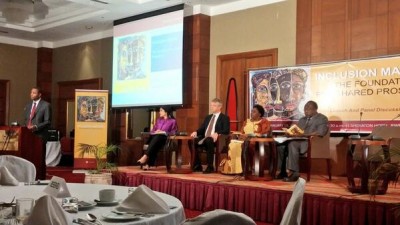
Photo taken by @hivocolab during the launch of the World Bank's “Inclusion Matters” report in Uganda. Used with permission.
Certain groups of people in all countries seem to be left behind despite their home country's progress. The social exclusion of these people – not always minorities, and not always in poor or undemocratic countries – has costly economic, political and social consequences, according to a new report from the World Bank.
For example, the report notes that in Uganda where electricity coverage is low, almost half of respondents from the Buganda ethnic group reported having electricity, compared to less than 5 percent of the minority Lugbara and karamajong ethnic groups. Some excluded groups have been denied opportunities for hundreds of years, such as Native Americans in the United States.
It also points out that poverty and exclusion are not the same. In some societies, even the rich can be excluded, as might be the case with wealthy homosexual men in some African countries.
The launch of the report, titled “Inclusion Matters”, was held on 27 January 2014 in Kampala, Uganda alongside a public dialogue on the topic of social inclusion. Tarsis Kabwegyere, the Minister for General Duties in the Office of the Ugandan Prime Minister, and Mary Karoro Okurut, the Ugandan Minister of Gender, Labour and Social Development, attended the event; notably, Dr. Zac Niringiye, an outspoken former bishop of Kampala West, was among the panelists.
Explaining the concept of social inclusion, the World Bank website said:
Some people – because of personal or group characteristics, such as social status, ethnicity, disability, or sexual orientation – are mistreated, insulted, and disrespected. These people may either avoid situations that expose them to mistreatment, they may submit to their “fate”, or they may protest against it. All these responses are cries for inclusion.
Twitter users joined in the conversation using the hastag #inclusionmatters.
Journalist Henry Lutaaya asked:
@DasMaitreyi Why did #InclusionMatters ignore international community role in excluding billions of pipo from trade, fueling climate change
— Henry Lutaaya (@henrylutaaya) January 29, 2014
Electronic Kasujja noted:
Policy choices of the country determine whether there will in fact be less exclusion and more inclusion. #inclusionmatters
— Electronic Kasujja (@ekasujja) January 28, 2014
Activist and storyteller Javie Ssozi quoted Niringiye speaking about Uganda:
The tragedy with this country is we have failed to implement basic ideas. To make UPE [Universal Primary Education] work is not rocket science. Rev Zac #InclusionMatters
— Javie Ssozi (@jssozi) January 28, 2014
Mark Keith Muhumuza, a business and financial journalist in Uganda, quoted the report:
On accessing markets, WB report reads “Urban land markets are notoriously skewed in favor of the rich in powerful;” #inclusionmatters
— Mark Keith Muhumuza (@mumakeith) January 28, 2014
Web portal UGO Uganda wrote:
Hon.Tarsis Kabwegyere says inclusion and exclusion is about power #InclusionMatters http://t.co/MpqndJuKEo
— UGO Uganda (@UgoUganda) January 28, 2014
Cedric Anil, a blogger, quoted Minister of General Duties Kabwegyere:
It's hard to be distributive when 90% of the people are poor -Hon. Kabwegyere #inclusionMatters report launch #World Bank
— Cedric Anil (@cedricanil) enero 28, 2014
Javie Ssozi questioned the assertion that government has a plan for social inclusion:
Pius Bigirimana says “government has got a plan to ensure that no one is excluded”. Sounds exciting! What's the plan? #InclusionMatters
— Javie Ssozi (@jssozi) January 28, 2014
As the dialogue concluded, Charles Banda, a digital and new media consultant, wanted to know:
What next after the launch of the @WorldBankAfrica #InclusionMatters report ? do the young people feel included? pic.twitter.com/VEIqk5Yj1e
— Charles E. Bbanda™ (@bbandac) January 28, 2014







4 comments
It’s a pity that in University we aren’t being kept to date with such matters of importance when it comes to the global socio-politico landscape, instead greater emphasis is played on rules and principles which mean zero to the uneducated and most affected populous.
More willing hands need to be placed on the ground by the UN with the support of local government in order that the political tensions are settled from the ground up and not vis-a-vis. However such work requires that the nations people are also willing to not just make noise about injustices, but partake in the work for improvement and justice for all.